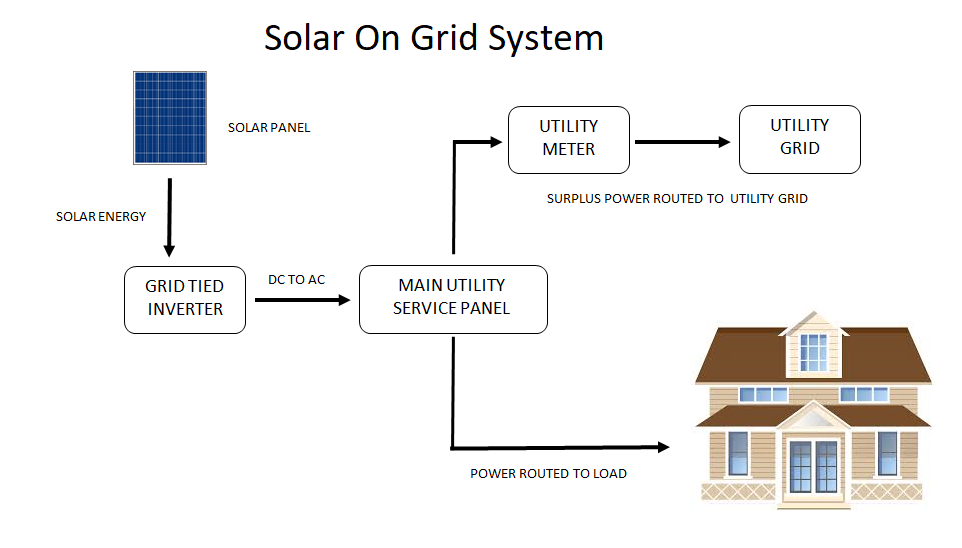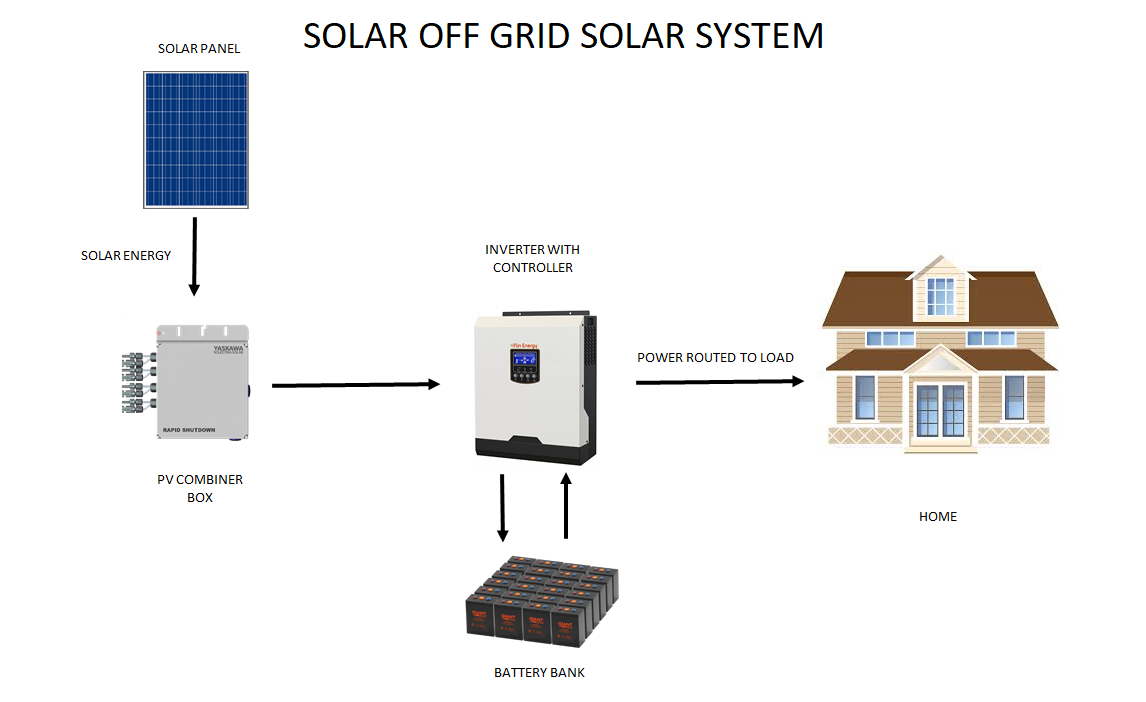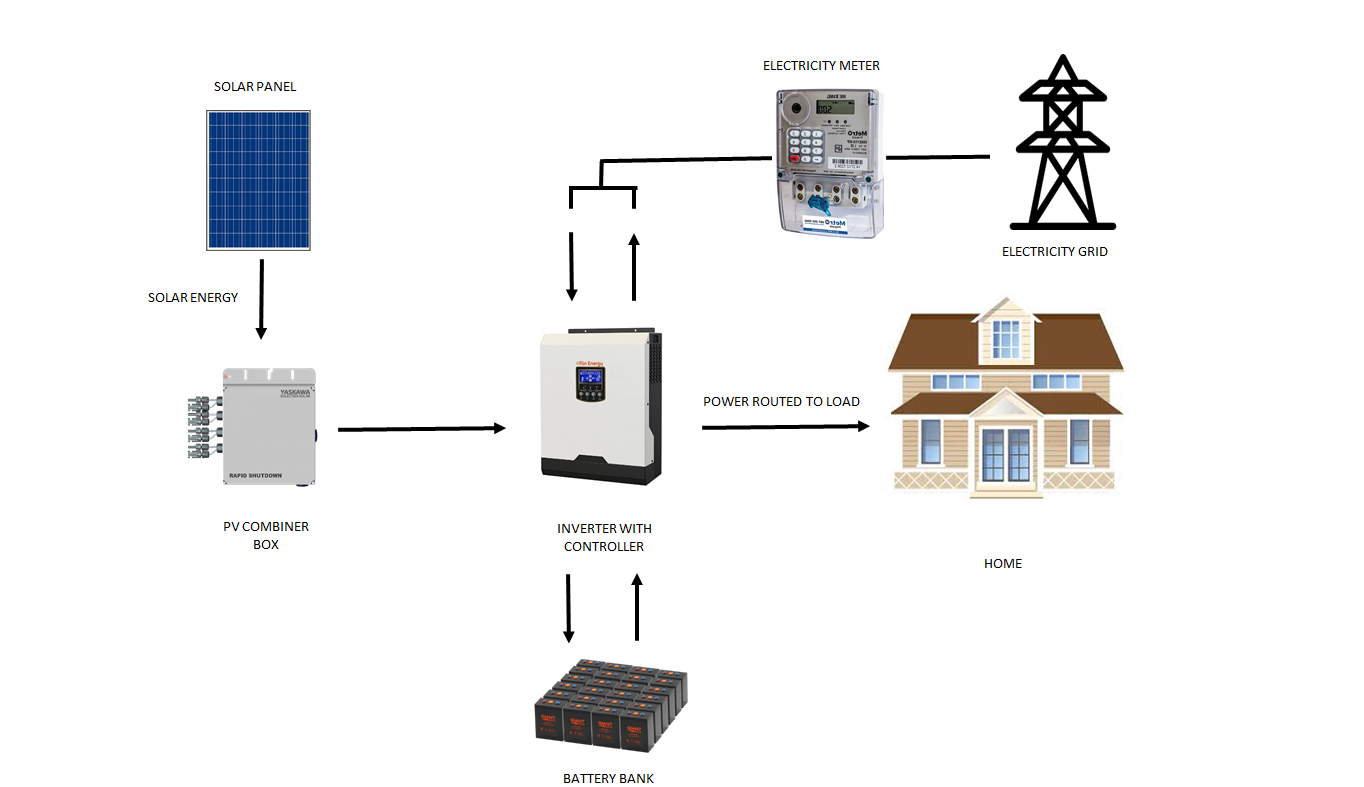Grid-Tied Solar Systems
Grid-tied, on-grid, utility-interactive, grid intertie and grid backfeeding are all terms used to describe the same concept – a solar system that is connected to the utility power grid.

Advantages of Grid-Tied Systems
1. Save more money with net metering
A grid-connection will allow you to save more money with solar panels through better efficiency rates, net metering, plus lower equipment and installation costs:
Batteries, and other stand-alone equipment, are required for a fully functional off-grid solar system and add to costs as well as maintenance. Grid-tied solar systems are therefore generally cheaper and simpler to install.
Your solar panels will often generate more electricity than what you are capable of consuming. With net metering, homeowners can put this excess electricity onto the utility grid instead of storing it themselves with batteries.
Net metering (or feed-in tariff schemes in some countries) play an important role in how solar power is incentivized. Without it, residential solar systems would be much less feasible from a financial point of view.
Many utility companies are committed to buying electricity from homeowners at the same rate as they sell it themselves.
2. The utility grid is a virtual battery
Electricity has to be spent in real time. However, it can be temporarily stored as other forms of energy (e.g. chemical energy in batteries). Energy storage typically comes with significant losses.
The electric power grid is in many ways also a battery, without the need for maintenance or replacements, and with much better efficiency rates. In other words, more electricity (and more money) goes to waste with conventional battery systems.
According to EIA data[1], national, annual electricity transmission and distribution losses average about 7% of the electricity that is transmitted in the United States. Lead-acid batteries, which are commonly used with solar panels, are only 80-90% efficient at storing energy, and their performance degrades with time.
Additional perks of being grid-tied include access to backup power from the utility grid (in case your solar system stop generating electricity for one reason or another). At the same time you help to mitigate the utility company`s peak load. As a result, the efficiency of our electrical system as a whole goes up.
Off-Grid Solar Systems
An off-grid solar system (off-the-grid, standalone) is the obvious alternative to one that is grid-tied. For homeowners that have access to the grid, off-grid solar systems are usually out of question. Here`s why:
To ensure access to electricity at all times, off-grid solar systems require battery storage and a backup generator (if you live off-the-grid). On top of this, a battery bank typically needs to be replaced after 10 years. Batteries are complicated, expensive and decrease overall system efficiency.

Advantages of Off-Grid Solar Systems
1. No access to the utility grid
Off-grid solar systems can be cheaper than extending power lines in certain remote areas.
Consider off-gird if you’re more than 100 yards from the grid. The costs of overhead transmission lines range from $174,000 per mile (for rural construction) to $11,000,000 per mile (for urban construction).
2. Become energy self-sufficient
Living off the grid and being self-sufficient feels good. For some people, this feeling feeling is worth more than saving money. Energy self-sufficiency is also a form of security. Power failures on the utility grid do not affect off-grid solar systems.
On the flip side, batteries can only store a certain amount of energy, and during cloudy times, being connected to the grid is actually where the security is. You should install a backup generator to be prepared for these kinds of situations.
Hybrid Solar Systems
Hybrid solar systems combines the best from grid-tied and off-grid solar systems. These systems can either be described as off-grid solar with utility backup power, or grid-tied solar with extra battery storage.

Advantages of Hybrid Solar Systems
1. Less expensive than off-gird solar systems
Hybrid solar systems are less expensive than off-grid solar systems. You don’t really need a backup generator, and the capacity of your battery bank can be downsized. Off-peak electricity from the utility company is cheaper than diesel.
2. Smart solar holds a lot of promise
The introduction of hybrid solar systems has opened up for many interesting innovations. New inverters let homeowners take advantage of changes in the utility electricity rates throughout the day.
Solar panels happen to output the most electrical power at noon – not long before the price of electricity peaks. Your home and electrical vehicle can be programmed to consume power during off-peak hours (or from your solar panels).
Consequently, you can temporarily store whatever excess electricity your solar panels in batteries, and put it on the utility grid when you are paid the most for every kWh.
Smart solar holds a lot of promise. The concept will become increasingly important as we transition towards the smart grid in the coming years.
